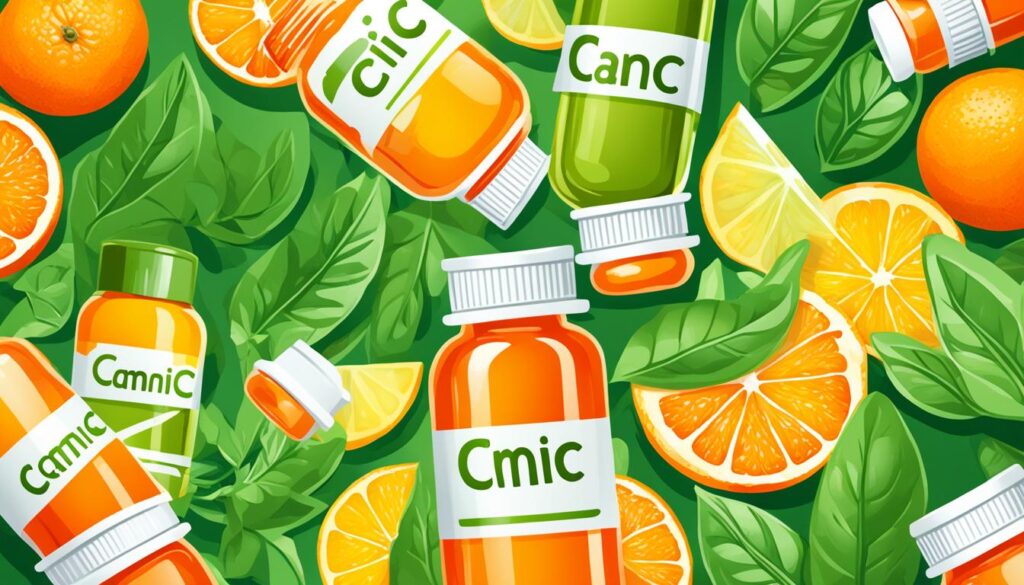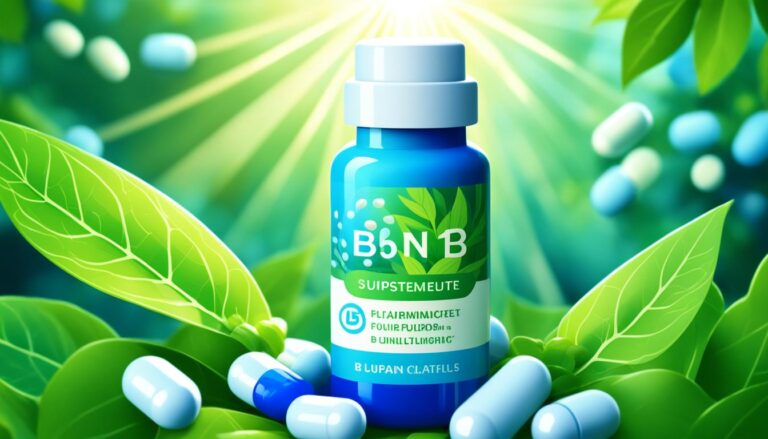Vitamin C is a strong antioxidant. It boosts your body’s defenses and brings many health benefits. This nutrient protects your cells from harm and helps your immunity fight off illness.
It’s key for keeping your skin healthy and young. Adding vitamin C capsules to your daily plan is an easy way to make sure you get enough of this important vitamin.
Vitamin C does a lot for your health, from your skin to your immune system. Knowing all the good things it does can help you make better health choices. Let’s look at how vitamin C capsules can make your skin and immunity even better. This will help you take better care of yourself.
Introduction to Vitamin C and Its Benefits
Vitamin C is also called ascorbic acid. It’s really important for our health. But, our bodies can’t make it. So, we need to eat foods or take pills that have it.
What is Vitamin C?
Vitamin C loves water and is in many fruits and veggies. Think oranges, sweet peppers, and even broccoli. It fights off bad stuff in our bodies, keeping us healthy.
Why is Vitamin C Important?
- It helps our immune system stay strong.
- Makes our skin, hair, and nails look and feel good.
- Works with iron to carry oxygen in our blood.
- Drops the chance of getting very sick.
- Helps cuts and wounds get better faster.
- Keeps our blood pressure normal.
Vitamin C is a big deal for our health. It’s key to making sure we feel well. Eat foods high in vitamin C or take a supplement. This will help you stay healthy and full of life.
Vitamin C and Skin Health
Vitamin C is good for your skin in many ways. It fights off bad stuff that harms skin and makes it age too fast. It helps make collagen, a protein that keeps your skin firm and elastic.
Antioxidant Properties of Vitamin C
Vitamin C fights against skin aging as an antioxidant. It tackles free radicals from the sun, pollution, and stress. This helps keep your skin looking fresh and young.
Collagen Production and Skin Elasticity
Vitamin C is key to making collagen. Collagen keeps your skin from sagging and makes wrinkles less visible. So, vitamin C helps your skin look and feel youthful.
High vitamin C intake is linked to healthier skin. Using vitamin C on your skin can lower wrinkles and boost collagen. Mixing vitamin C with vitamin E helps guard your skin from the sun.

Vitamin C also speeds up healing, lessens dark spots, and fades acne scars. It adds moisture to your skin, making it look young and lively.
Vitamin C for Immunity Boosting
Keeping your immune system strong is key for good health. Vitamin C is great for this. It helps your white blood cells, which fight off sickness, work better.
Role of Vitamin C in White Blood Cell Function
Vitamin C is like a boost for your white blood cells. It makes them better at finding and stopping bad germs. This keeps your immune system in top shape.
- White blood cells do an important job in fighting sickness, and vitamin C keeps them working well.
- It also helps make more white blood cells. This makes sure you have enough if you get sick.
- Plus, vitamin C improves how well white blood cells can get rid of viruses and bacteria.
Vitamin C makes your white blood cells stronger. This makes your whole immune system better. You can get more vitamin C by taking supplements like The Vitamin Company’s 1000 mg tablets.

Adding vitamin C capsules to your daily plan is good for your immune system, skin, and health in general. Look for the right vitamin C supplement that fits what you need and like. There’s a big choice out there.
Recommended Daily Intake of Vitamin C
It’s key to keep up your vitamin C for great skin and a strong immune system. Adults should aim for 75 mg if they’re women, and 90 mg if they’re men. Smokers need extra, about 35 mg more every day. For pregnant and breastfeeding women, the need goes up to 85-120 mg each day.
Vitamin C shortage is not common in the U.S. or other places. Yet, if someone doesn’t eat enough, they might not get all the vitamin C they need. This is where eating right and maybe taking some extra vitamin C can help. It’s a good way to stay healthy.
Orange juice or red pepper can give you all the vitamin C you need in a day. Eating fruits and veggies that are full of vitamin C is a great idea. They help our body make collagen, use iron, and keep our immune system strong. They also help with healing and keep our tissues in good shape.
Vitamin C can be safely taken at 2,000 milligrams a day. But, if you take too much, like more than 2,000 milligrams, you might get a tummy ache or diarrhea. For most people, 500 milligrams a day is safe and enough.
Eating foods with lots of vitamin C fresh or lightly cooked keeps vitamin C strong. Mix it with foods rich in iron to help your body get more iron. Vitamin C helps with staying healthy in many ways.
In short, get enough vitamin C from what you eat and maybe some extra. It’s great for your skin and keeps you feeling well. By making sure you get the right amount every day, you help your body a lot.
Vitamin C and Wound Healing
Vitamin C is key for healing wounds. It protects the skin and helps it repair. It does this by making collagen, a protein that supports and fixes tissues. This speeds up healing and lowers the chance of problems.
Vitamin C’s Role in Wound Repair
Vitamin C does many important jobs when we heal:
- It helps make collagen. Collagen is a big part of the skin and tissues. Vitamin C makes sure new collagen forms well. This is vital for fixing wounds.
- Vitamin C boosts white blood cells. These cells fight infections and help the body heal. A better immune system helps wounds heal faster.
- It fights off free radicals with antioxidants. This protection is key for the skin and tissues to heal well.
Vitamin C helps our bodies heal in many ways. Eating enough foods high in vitamin C or taking supplements is important. It makes your body’s healing process work better.

Vitamin C for Healthy Aging
Getting older can add stress to your skin and health. Yet, vitamin C is great for fighting early aging. It helps by fighting off the signs of older skin.
Vitamin C boosts collagen, which keeps your skin firm and young looking. It also fights off bad elements that age your skin. This keeps you looking fresh and reduces wrinkles.
Adding vitamin C to your daily routine is smart. It counters aging’s effects and keeps you well. The sweet spot for most adults is 75mg-90mg a day.
Take up to 1,000mg for even better effects. But, know that going over 2,000mg a day is too much. This can cause stomach problems and diarrhea.
Using vitamin C supplements can be easy. They help make sure you get enough for good skin and health. Remember to get vitamin C from natural sources like fruits and veggies. This, plus supplements, can make your skin look young and keep you healthy as you get older.
Protecting Your Skin from Sun Damage
Staying in the sun too long is bad for your skin. It can make you look older, get sunspots, and raises skin cancer risk. Luckily, Vitamin C helps a lot because of its antioxidant power.
How Vitamin C Helps
Vitamin C fights bad particles in the air. It also helps the skin stay strong. So, you get less damage from too much sun, and your skin looks better. It’s safe for most people to use a lot of vitamin C on their skin.
Skin products with vitamin C are usually 10% to 20% vitamin C. The best type is ascorbic acid, which goes into your skin well. A kind called magnesium ascorbyl phosphate makes your skin less dry.
A special mix with Deschampsia antarctica, ferulic acid, and vitamin C keeps water in your skin better. Putting on vitamin C also stops too much melanin. This means your dark spots could lighten up.
Vitamin C helps make collagen, which keeps your skin firm. It also stops skin cells from breaking down. This helps your skin fight off sun damage better.
Putting vitamin C on your skin helps it heal faster. Mixes of tyrosine, zinc, and vitamin C make vitamin C work much better. This makes your skin’s defense against the sun even stronger. And it makes your skin look less damaged.
Vitamin C Capsules and Their Impact on Skin Conditions
Vitamin C is great for your health and skin. It helps your body fight sickness and makes your skin look good. This vitamin is key for handling many skin problems. It should be in your daily skin care plan.
Vitamin C fights skin issues by being anti-inflammatory. When you have acne, your skin gets red and sore. Taking vitamin C capsules daily can calm these signs. This leads to skin that looks clear and feels better.
It also stops too much melanin, which can make your skin look dark in spots. If you’re annoyed by dark spots, vitamin C can help. It makes your skin tone look more even and bright.
Vitamin C helps your skin look young by boosting collagen. Collagen keeps your skin bouncy and tight. It lessens wrinkles and other signs of getting older. So, vitamin C gives you a fresh and young glow.
Using vitamin C capsules is easy and works well for your skin. They are full of vitamin C that your body easily uses. Including these capsules in your routine can make a big difference. Your skin will thank you for the care.
Boosting Iron Absorption with Vitamin C
Iron is super important for moving oxygen in our blood. Lots of people have trouble with not enough iron, sometimes leading to anemia. But, adding vitamin C to your diet can make it easier for your body to soak up iron, especially from veggies.
Animal foods have heme iron, which our bodies grab more easily. Plant foods have non-heme iron, which is harder for us to use. Eating stuff high in vitamin C, like fruits and some veggies, helps our bodies use the iron from plants better.
- Iron helps carry oxygen, gives us energy, and makes our brains work better.
- People who don’t eat animal products might not get enough iron since it’s harder to get from plants.
- Not having enough iron can cause tiredness and feeling dizzy.
Pairing iron-rich foods with vitamin C can really up the iron our bodies pick up. Stuff like lemons, strawberries, oranges, or red peppers with our meals can do the trick. This is key for folks with picky diets or if you’re having trouble with nutrient combos.
While adding some vitamin C from diet or supplements is good, a balanced diet is best. Pick foods high in vitamin C to help your body make the most of the iron it gets. This is great for staying healthy and feeling good.
Potential Side Effects and Precautions
Vitamin C is mostly well-tolerated. Yet, know about possible vitamin c side effects. Taking too much vitamin C might lead to tummy problems like feeling sick, having looser stool, and stomach pains.
People with certain health issues, like kidney stones or G6PD deficiency, should be careful with vitamin C. It’s smart to talk to a doctor before adding vitamin C to your diet, especially if you have health problems already.
In a pilot study on kids with autism, vitamin C supplementation was okay. No bad effects were found.
- Vitamin C has been checked in different health situations. For example, it’s been looked at in patients on hemodialysis to see how it affects stress and fats in the blood.
- Other studies see how adding riboflavin and ascorbic acid affects blood in young adults in Nigeria.
- Then, there’s research on adding alpha-tocopherol and beta-carotene to see the effect on colon cancer in a Finland trial.
Though these are good studies, how you react to vitamin C can vary. Talk to your healthcare provider to know the right amount and use for you.

Being careful of side effects and taking necessary steps lets you use vitamin C safely. This way, you can enjoy its good effects on your skin, immunity, and health.
Vitamin C and Chronic Disease Prevention
New studies show vitamin C is great against diseases. It fights heart issues, some cancers, and brain problems. Vitamin C stops bad free radicals and helps our bodies stay strong. This stops health problems before they start.
Adding vitamin C to your life is smart. It can:
- Make your heart healthier by fixing your blood and blood vessels
- Help against some cancers by making your body stronger and stopping bad cells
- Keep your brain sharp by calming down swelling and stress
Vitamin C also fights inflammation, a cause of many issues. It kills dangerous free radicals and boosts our natural defenses. So, it keeps us healthy all around.
Eating foods with lots of vitamin C is a good start. Think citrus fruits, peppers, and greens. If getting enough in your diet is hard, try vitamin C capsules. They are easy and help keep you healthy.
Vitamin C for Healthy Blood Pressure
Vitamin C can help you keep a healthy blood pressure. It’s full of antioxidants. These can help your blood pressure stay right. This makes it a good addition for keeping your heart healthy.
This vitamin can make your blood vessels open up more. That means your blood pressure can go down. It’s really good for people who have high blood pressure. High blood pressure is common and can cause heart problems.
But that’s not all. Vitamin C also makes your heart’s pipes work better and it calms down swelling. This keeps your heart healthy. Plus, it can help stop other heart problems too.
To get more vitamin C, eat foods with lots of it. You can also take vitamin C pills. This, plus cutting back on salt, moving more, and staying a good weight, can help your blood pressure stay normal.

Always talk to your doctor before changing your diet or adding new vitamins. This is especially true if you are already sick. With a doctor’s help and some lifestyle changes, vitamin C can do great things for your heart and blood pressure.
Vitamin C and Cognitive Health
There is new evidence that says vitamin C is key in helping our cognitive function. It may lower the risk of losing our memory as we grow older. The strong power of vitamin C fights the harm that oxidative stress can do to our brains. This stress can lead to conditions like Alzheimer’s.
The benefits don’t stop there. Vitamin C helps keep our central nervous system healthy too. Studies show adding vitamin C to older folks’ daily routines in nursing homes makes a difference. It hints that vitamin C could help in keeping the brain working well with age.
Yet, we still need more research to know all about vitamin C and our brains. Making sure we get enough vitamin C from food or supplements could be smart. This helps keep our brain healthy and our thinking sharp as we get older.
Take note, though. Too much vitamin E could be bad. It might raise the death risk in some cases and up the chance of a stroke. At the same time, taking 800 IU of vitamin E doesn’t seem to help those with Alzheimer’s think better. How much vitamin C and vitamin E we need for our brains is still being looked into.
In a nutshell, we’re seeing that vitamin C does a lot of good for our brain’s health and keeps our memory sharp as we get older. Eating vitamin C-rich foods or using its supplements is a straightforward way to boost your brain health.
Conclusion
Vitamin C is key for skin health and boosts immunity. It works as a strong antioxidant and helps make collagen. It also speeds up wound healing. Taking vitamin C capsules every day is an easy way to get enough of this important nutrient. It helps your skin, immune system, and keeps you healthy.
Vitamin C makes your skin glow and helps you stay strong. It makes you ready to tackle each day’s challenges. Whether you want better skin or to fight off sickness, vitamin C is your friend. Let this amazing nutrient aid you in having great skin and a strong immune system.
A diet full of vitamin C from fruits and veggies is essential. But, you can add extra vitamin C through capsules. This mix is your secret to a radiant skin and unstoppable immunity. Enjoy the big benefits these capsules offer your health and wellness.
FAQ
What is Vitamin C?
Vitamin C is a special nutrient our bodies need. They can’t make it. We must get it from foods or supplements.
Why is Vitamin C important?
It does a lot for our body. It boosts our immune system and helps our skin heal. Also, it’s key for iron to work well in our bodies.
How does Vitamin C benefit skin health?
It fights bad stuff called free radicals. Those can age our skin early. Vitamin C also helps make our skin strong and stretchy.
What is the role of Vitamin C in immune system function?
Vitamin C is great for our immune system. It helps white blood cells work better. These cells fight off sickness.
Why are Vitamin C capsules a convenient source?
Eating lots of fruits and veggies is best for Vitamin C. But, it’s hard for many. Capsules make it easy to get enough every day.
What is the recommended daily intake of Vitamin C?
Adults should aim for 75 to 90 mg every day. Yet, some people need more, like smokers or if you are having a baby.
How does Vitamin C support wound healing?
It helps in making collagen for the body. Collagen is vital for healing tears in our skin. Also, it boosts our immunity to stop infection.
How can Vitamin C help combat the signs of aging?
It fights off free radicals. This helps keep our skin young. It also supports collagen, which makes our skin smooth and young-looking.
How does Vitamin C protect the skin from sun damage?
It blocks some of the sun’s harmful effects on our skin. This includes signs of early aging, dark spots, and even cancer.
How can Vitamin C capsules address various skin conditions?
Capsules ease redness and swelling with acne. They also lighten dark spots and make skin tone even.
How does Vitamin C enhance iron absorption?
It’s a friend to iron in our body. By eating foods rich in Vitamin C or taking supplements, we absorb iron better.
What are the potential side effects and precautions of Vitamin C?
Too much Vitamin C can upset our stomach. It may not be good for everyone, such as those with certain health issues.
How can Vitamin C help prevent chronic diseases?
Studies show it might help prevent big diseases. It fights off harmful things and keeps our body less inflamed.
Can Vitamin C help maintain healthy blood pressure?
Yes, its antioxidants can help our blood vessels. This can lower our blood pressure, keeping our heart healthy.
What is the connection between Vitamin C and cognitive health?
It may help keep our brain sharp as we get older. By fighting off brain damage, it supports our brain’s health and function.
















Leave a Comment